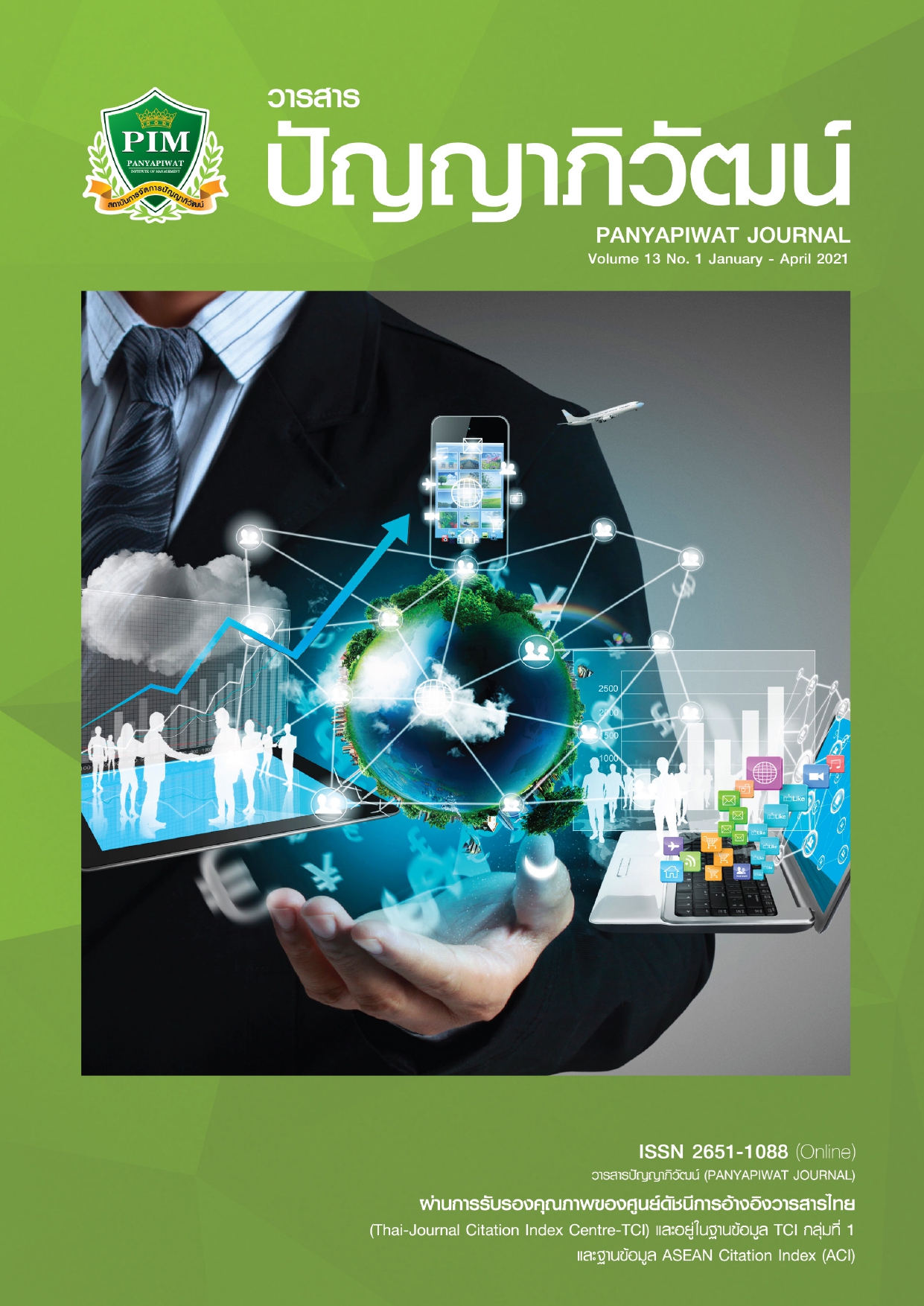เมืองมรดกโลกกับการสร้างอัตลักษณ์ด้วยทุนทางวัฒนธรรมในธุรกิจสปา
Main Article Content
บทคัดย่อ
บทความมีวัตถุประสงค์เพื่อ 1) อธิบายแนวทางการค้นหาจังหวัดที่มีทุนทางวัฒนธรรมสำหรับ การสร้าง อัตลักษณ์ให้กับธุรกิจสปา และ 2) วิเคราะห์แนวเรื่องทุนทางวัฒนธรรม การวิจัยใช้วิธีการเชิงคุณภาพ ได้แก่ 1) การวิจัยเอกสารจากการศึกษานโยบายและแผนที่เกี่ยวข้องกับการพัฒนาเศรษฐกิจด้วย ทุนทางวัฒนธรรม หลังจากนั้นนำข้อค้นพบจังหวัดที่มีแนวทางการพัฒนาด้วยทุนทางวัฒนธรรมให้ผู้ทรงคุณวุฒิ จำนวน 5 คน พิจารณาคัดเลือกจังหวัดที่มีความเหมาะสมในการศึกษา และ 2) การสัมภาษณ์ผู้ให้ข้อมูลหลัก ด้วยแบบสัมภาษณ์ แบบมีโครงสร้าง คณะผู้วิจัยใช้การวิเคราะห์แก่นสาระ เพื่ออธิบายแนวเรื่อง ทุนทางวัฒนธรรม ผลการวิจัยพบว่า แนวทางการค้นหาทุนทางวัฒนธรรม สำหรับการสร้างอัตลักษณ์ให้กับธุรกิจสปาต้อง ศึกษานโยบาย ยุทธศาสตร์ แผนของกระทรวง แผนพัฒนากลุ่มจังหวัด และแผนพัฒนาจังหวัด ซึ่งจังหวัดสุโขทัย เป็นจังหวัดที่ได้รับการคัดเลือกให้เป็นพื้นที่ศึกษาทุนทางวัฒนธรรม สำหรับการสร้างอัตลักษณ์ให้กับธุรกิจสปา เพราะจังหวัดสุโขทัยกำหนดประเด็นการพัฒนาด้านทุนทางวัฒนธรรมในแผนพัฒนาจังหวัดอย่างชัดเจน และ จังหวัดสุโขทัยมีจุดแข็งด้านทุนทางวัฒนธรรม ได้แก่ การเป็นเมืองมรดกโลก งานศิลปหัตถกรรมที่โดดเด่น เช่น งานทองคำ เครื่องสังคโลก เป็นต้น และการได้รับคัดเลือกให้เป็นเครือข่ายเมืองสร้างสรรค์ด้านผลิตภัณฑ์ผ้าทอ ผลการวิเคราะห์แนวเรื่องทุนทางวัฒนธรรมพบว่า จังหวัดสุโขทัยมีแนวทางเรื่องที่แสดงทุนทางวัฒนธรรม 4 แนว เรื่อง ได้แก่ 1) ความสุข ประกอบด้วย ความพอเพียง มรดกทางวัฒนธรรม และความภาคภูมิใจ 2) ความประณีต ประกอบด้วย การผลิตด้วยช่างฝีมือผู้ชำนาญ การใช้วัตถุดิบที่มีคุณภาพ และความละเอียดอ่อนช้อย 3) ภูมิปัญญา ประกอบด้วย การตื่นรู้ การคงอัตลักษณ์ดั้งเดิม และเรียนรู้จากภูมิปัญญาบรรพบุรุษ และ 4) วิถีชุมชน ประกอบ ด้วยการผสานเข้ากับวิถีวัฒนธรรมชุมชนและการใช้ในชีวิตประจำวัน
Article Details
“ข้าพเจ้าและผู้เขียนร่วม (ถ้ามี) ขอรับรองว่า บทความที่เสนอมานี้ยังไม่เคยได้รับการตีพิมพ์และไม่ได้อยู่ระหว่างกระบวนการพิจารณาลงตีพิมพ์ในวารสารหรือแหล่งเผยแพร่อื่นใด ข้าพเจ้าและผู้เขียนร่วมยอมรับหลักเกณฑ์การพิจารณาต้นฉบับ ทั้งยินยอมให้กองบรรณาธิการมีสิทธิ์พิจารณาและตรวจแก้ต้นฉบับได้ตามที่เห็นสมควร พร้อมนี้ขอมอบลิขสิทธิ์บทความที่ได้รับการตีพิมพ์ให้แก่สถาบันการจัดการปัญญาภิวัฒน์หากมีการฟ้องร้องเรื่องการละเมิดลิขสิทธิ์เกี่ยวกับภาพ กราฟ ข้อความส่วนใดส่วนหนึ่งและ/หรือข้อคิดเห็นที่ปรากฏในบทความข้าพเจ้าและผู้เขียนร่วมยินยอมรับผิดชอบแต่เพียงฝ่ายเดียว”
เอกสารอ้างอิง
Chan-et, J. (2019). The Potential Thai Identity of Spa and Massage Business Thailand to Raise the Level of International Health Tourism. Panyapiwat Journal, 10(2), 1-15. [in Thai]
Issichaikun, R. & Chansawang, R. (2016). A Study of the Potential of Thai Spa Establishments. Modern Management Journal, 14(1), 17-31. [in Thai]
Kasikorn Thai Research Center. (2019). Open the Business Dart Next Year 2019. Retrieved February 20, 2020, from https://bit.ly/31a3NA8 [in Thai]
Laohapensang, C. & Saengratwatchara, S. (2019). Product Development from Cultural Capital, Ancient Market, Si Satchanalai District Sukhothai Province. Journal of Industrial Education, 17(1), 52-60. [in Thai]
Laohapensang, C. (2015). Product Development based on Creative Economy Concepts from Culture Area of Sukhothai Historical Park Si Satchanalai Kamphaeng Phet. Journal of Industrial Education, 14(2), 228-235. [in Thai]
Mankong, A. (2017). The Role of Cultural Capital and Community Economic Development A case study of Communities in Ban Toon Subdistrict, Mueang District, Phayao Province. Research and Development Journal, Loei Rajabhat University, 39(12), 90-100. [in Thai]
Ministry of Public Health. (2016). Strategy to Develop Thailand to be an International Health Center 2017-2026. Retrieved February 20, 2020, from https://bit.ly/39aQly4 [in Thai]
Ministry of Public Health. (2017). National Health Development Plan 12th Issue 2017-2021. Retrieved February 20, 2020, from https://bit.ly/2PZkj1y [in Thai]
Nisavutanuphan, Y. & Phirasan, C. (2017). Cultural Capital Model for Increasing Value of Tourism Products in Chiang Rai Province. Veridian E-Journal, Silpakorn University (Humanities, Social Sciences and arts), 12(9), 931-949. [in Thai]
Office of the Academic Parliament. (2019). Policy Statement of the Cabinet. Retrieved February 20, 2019, from https://bit.ly/2OqIuVB [in Thai]
Office of the National Economics and Social Development Council. (2017). Master Plan under the National Strategy Tourism Issues 2018-2037. Retrieved February 20, 2020, from https://bit.ly/2TFQAvv [in Thai]
Onaree, N. (2017). The Merger of Cultural Assets in Packaging Design of Souvenirs from Japan. Journal of Information, 16(2), 31-41. [in Thai]
Phu-Ku, C. (2017). Guidelines for the Development of Capital, Culture, Innovation to Thailand 4.0. Retrieved February 20, 2020, from https://bit.ly/3aeqLJO [in Thai]
Phuwanatwichit, T. (2016). Cultural Capital Development and Tourism Attraction Management for Culture Village Wiang Tha Kan, San Pa Tong District, Chiang Mai Province. Journal of Community Development and Life Quality, 5(1), 14-23. [in Thai]
Pinyosinwat, N. (2019). UNESCO Announces Sukhothai to Receive the Creative City Network Award. Retrieved February 20, 2019, from https://bit.ly/2TC9d3n [in Thai]
Porkatong, S. (2014). The Development of Environmental Factors in Enhancing the Potential of Using Cultural Capital for Branding of OTOP Entrepreneurs in the Category of Arts and crafts. Research Methodology and Cognitive Science, 12(1), 69-77. [in Thai]
Prampree, T. (2019). Community and Tourism Economic Development with Cultural Capital: A Case Study of Naga Savage Parade, Ban Non Salao, Nong Tum Subdistrict, Chaiyaphum Province. Journal of Cultural Approach, 20(38), 40-52. [in Thai]
Punsawasuth, A. (2010). Cultural Capital in an Economic Growth Model. Retrieved February 20, 2020, from https://bit.ly/3apibaQ [in Thai]
Srimueang, T. (2019). An Analysis of Innovation and Thai Culture in the 21st Century: Creating Capital Cultural Innovation And the Creative Economy. The 4th National and International Academic Conference Innovation and Technology Development for Sustainable Economy (pp. 72-86). Bangkok: Nakhon Pathom Rajabhat University. [in Thai]
Sripola, S. (2010). Qualitative Research and Qualitative Data Analysis. Retrieved May 22, 2020, from https://bit.ly/3e4E1SQ [in Thai]
Srisa-an, W., Wongsothorn, T., & Uaewong, K. (n.d.). Concepts and Principles of Policy and Planning. Retrieved February 20, 2020, from https://bit.ly/2QzvLBg [in Thai]
Sukhothai Provincial Industrial Office. (2017). Establishment of a Cluster of Woven and Woven Fabric Products in Sukhothai Province. Retrieved February 20, 2017, from https://bit.ly/2PMYS3q [in Thai]
Sukhothai Provincial Office. (2018). Sukhothai Development Plan 2018-2021. Retrieved February 20, 2020, from https://bit.ly/3dbIN1z [in Thai]
Suwannathada, S. & Sikkha, S. (2019). Design and Development of Community Products Using Cultural and Intellectual Capital in the Upper Northeast Region. Art and Architecture Journal Naresuan University, 9(2), 137-155. [in Thai]
Thampramaun, P. & The-Khan-Mak, K. (2020). The Development of Creative Tourism Management based on Cultural Capital to the Community Economy of Friends Agriculture Home Stay Club Wiset Chai Chan District, Ang Thong Province. Silpakorn University Journal, 40(1), 65-83. [in Thai]
Throsby, D. (2001). Economics and Culture. UK: Cambridge University Press.
Tinbut, P. & Thasuwan, N. (2019). The Use of Cultural Capital for the Design, Development of the Logo and the Appearance and Packaging of Herbal Products for Community Enterprise Groups in the Area the Area of the Upper Central Region of Thailand. Chandrakasem Rajabhat University Journal, 24(47), 126-141. [in Thai]
Varunsub, D. (2019). Patterns of Cultural Capital Management for Creative Tourism in Thailand. ARU Research Journal Humanities and Social Sciences, 5(1), 17-24. [in Thai]
Wongchaikun, P. (2019). Enhance the Thai Spa to the International Level, Pushing Operators to Capture Local Identity as a Selling Point. Retrieved February 20, 2019, from https://bit.ly/2tYjhLi [in Thai]
Wongkittikraiwan, M. (2019). Thai Spa Business Ranked in the Top 5 in Asia. Retrieved February 20, 2020, from https://bit.ly/38XdWTo [in Thai]
Yanyongkasemsuk, R. (2014). Elite Concepts and Capital of Pierre Bourdier. Journal of Political Economy, 2(1), 29-44. [in Thai]


